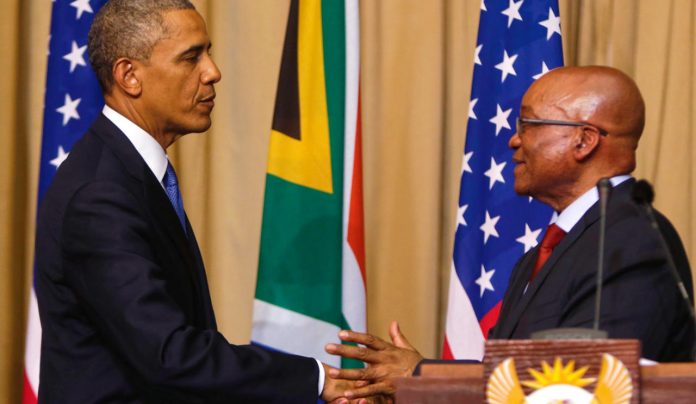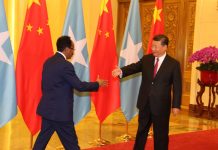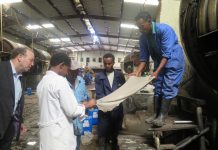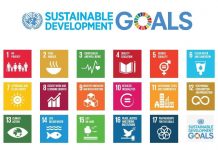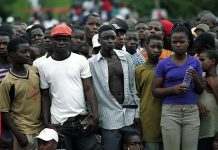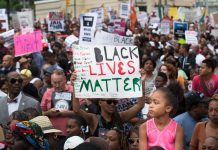I believe Africa’s rise is not just important for Africa, it’s important to the entire world. We will not be able to meet the challenges of our time—from ensuring a strong global economy to facing down violent extremism, to combating climate change, to ending hunger and extreme poverty—without the voices and contributions of one billion Africans.
Now, even with Africa’s impressive progress, we must acknowledge that many of these gains rest on a fragile foundation. Alongside new wealth, hundreds of millions of Africans still endure extreme poverty. Alongside high-tech hubs of innovation, many Africans are crowded into shantytowns without power or running water—a level of poverty that’s an assault on human dignity.
Moreover, as the youngest and fastest-growing continent, Africa’s population in the coming decades will double to some two billion people, and many of them will be young, under 18. Now, on the one hand, this could bring tremendous opportunities as these young Africans harness new technologies and ignite new growth and reforms. Economists will tell you that countries, regions, continents grow faster with younger populations. It’s a demographic edge and advantage—but only if those young people are being trained. We need only to look at the Middle East and North Africa to see that large numbers of young people with no jobs and stifled voices can fuel instability and disorder.
I suggest to you that the most urgent task facing Africa today and for decades ahead is to create opportunity for this next generation. And this will be an enormous undertaking. Africa will need to generate millions more jobs than it’s doing right now. And time is of the essence. The choices made today will shape the trajectory of Africa, and therefore, the world for decades to come. And as your partner and your friend, allow me to suggest several ways that we can meet this challenge together.
Africa’s progress will depend on unleashing economic growth—not just for the few at the top, but for the many, because an essential element of dignity is being able to live a decent life. That begins with a job. And that requires trade and investment.
Many of your nations have made important reforms to attract investment—it’s been a spark for growth. But in many places across Africa, it’s still too hard to start a venture, still too hard to build a business. Governments that take additional reforms to make doing business easier will have an eager partner in the United States.
And that includes reforms to help Africa trade more with itself—as [AU Chairwoman Nkosazana Dlamini-Zuma] and I discussed before we came out here today—because the biggest markets for your goods are often right next door. You don’t have to just look overseas for growth, you can look internally. And our work to help Africa modernize customs and border crossings started with the East African Community, now we’re expanding our efforts across the continent, because it shouldn’t be harder for African countries to trade with each other than it is for you to trade with Europe and America.
Now, most U.S. trade with the region is with just three countries—South Africa, Nigeria and Angola—and much of that is in the form of energy. I want Africans and Americans doing more business together in more sectors, in more countries. So we’re increasing trade missions to places like Tanzania, Ethiopia, Mozambique. We’re working to help more Africans get their goods to market. Next year, we’ll host another U.S.-Africa Business Forum to mobilize billions of dollars in new trade and investment—so we’re buying more of each other’s products and all growing together.
Now, the United States isn’t the only country that sees your growth as an opportunity. And that is a good thing. When more countries invest responsibly in Africa, it creates more jobs and prosperity for us all. So I want to encourage everybody to do business with Africa, and African countries should want to do business with every country.
But economic relationships can’t simply be about building countries’ infrastructure with foreign labor or extracting Africa’s natural resources. Real economic partnerships have to be a good deal for Africa—they have to create jobs and capacity for Africans.
And that includes the point that Chairwoman Zuma made about illicit flows with multinationals—which is one of the reasons that we’ve been a leading advocate, working with the G7, to assist in making sure that there’s honest accounting when businesses are investing here in Africa, and making sure that capital flows are properly accounted for. That’s the kind of partnership America offers.
Nothing will unlock Africa’s economic potential more than ending the cancer of corruption. And you are right that it is not just a problem of Africa, it is a problem of those who do business with Africa. It is not unique to Africa—corruption exists all over the world, including in the United States. But here in Africa, corruption drains billions of dollars from economies that can’t afford to lose billions of dollars—that’s money that could be used to create jobs and build hospitals and schools. And when someone has to pay a bribe just to start a business or go to school, or get an official to do the job they’re supposed to be doing anyway—that’s not “the African way.” It undermines the dignity of the people you represent.
Only Africans can end corruption in their countries. As African governments commit to taking action, the United States will work with you to combat illicit financing, and promote good governance and transparency and rule of law. And we already have strong laws in place that say to U.S. companies, you can’t engage in bribery to try to get business—which not all countries have. And we actually enforce it and police it.
And let me add that criminal networks are both fueling corruption and threatening Africa’s precious wildlife—and with it, the tourism that many African economies count on. So America also stands with you in the fight against wildlife trafficking. That’s something that has to be addressed.
But, ultimately, the most powerful antidote to the old ways of doing things is this new generation of African youth. History shows that the nations that do best are the ones that invest in the education of their people. You see, in this information age, jobs can flow anywhere, and they typically will flow to where workers are literate and highly skilled and online. And Africa’s young people are ready to compete.
I’ve met them—they are hungry, they are eager. They’re willing to work hard. So we’ve got to invest in them. As Africa invests in education, our entrepreneurship programs are helping innovators start new businesses and create jobs right here in Africa. And the men and women in our Young African Leaders Initiative today will be the leaders who can transform business and civil society and governments tomorrow.
Africa’s progress will depend on development that truly lifts countries from poverty to prosperity—because people everywhere deserve the dignity of a life free from want. A child born in Africa today is just as equal and just as worthy as a child born in Asia or Europe or America. At the recent development conference here in Addis, African leadership helped forge a new global compact for financing that fuels development. And under the AU’s leadership, the voice of a united Africa will help shape the world’s next set of development goals, and you’re pursuing a vision of the future that you want for Africa.
And America’s approach to development—the central focus of our engagement with Africa—is focused on helping you build your own capacity to realize that vision. Instead of just shipping food aid to Africa, we’ve helped more than two million farmers use new techniques to boost their yields, feed more people, reduce hunger. With our new alliance of government and the private sector investing billions of dollars in African agriculture, I believe we can achieve our goal and lift 50 million Africans from poverty.
Instead of just sending aid to build power plants, our Power Africa initiative is mobilizing billions of dollars in investments from governments and businesses to reduce the number of Africans living without electricity. Now, an undertaking of this magnitude will not be quick. It will take many years. But working together, I believe we can bring electricity to more than 60 million African homes and businesses and connect more Africans to the global economy.
Instead of just telling Africa, you’re on your own, in dealing with climate change, we’re delivering new tools and financing to more than 40 African nations to help them prepare and adapt. By harnessing the wind and sun, your vast geothermal energy and rivers for hydropower, you can turn this climate threat into an economic opportunity. And I urge Africa to join us in rejecting old divides between North and South so we can forge a strong global climate agreement this year in Paris. Because sparing some of the world’s poorest people from rising seas, more intense droughts, shortages of water and food is a matter of survival and a matter of human dignity.
Instead of just sending medicine, we’re investing in better treatments and helping Africa prevent and treat diseases. As the United States continues to provide billions of dollars in the fight against HIV/AIDS, and as your countries take greater ownership of health programs, we’re moving toward a historic accomplishment—the first AIDS-free generation. And if the world learned anything from Ebola, it’s that the best way to prevent epidemics is to build strong public health systems that stop diseases from spreading in the first place. So America is proud to partner with the AU and African countries in this mission. Today, I can announce that of the $1 billion that the United States is devoting to this work globally, half will support efforts here in Africa.
Yes, in our world, old thinking can be a stubborn thing. That’s one of the reasons why we need term limits—old people think old ways. And you can see my grey hair, I’m getting old. The old ways can be stubborn. But I believe the human heart is stronger. I believe hearts can change. I believe minds can open. That’s how change happens. That’s how societies move forward. It’s not always a straight line—step by halting—sometimes you go forward, you move back a little bit. But I believe we are marching, we are pointing towards ideals of justice and equality…
New thinking. Unleashing growth that creates opportunity. Promoting development that lifts all people out of poverty. Supporting democracy that gives citizens their say. Advancing the security and justice that delivers peace. Respecting the human rights of all people. These are the keys to progress—not just in Africa, but around the world. And this is the work that we can do together.
And I am hopeful. As I prepare to return home, my thoughts are with that same young man from Senegal, who said: Here, I have met Africa, the [Africa] I’ve always believed in. She’s beautiful and young, full of talent and motivation and ambition. To which I would simply add, as you build the Africa you believe in, you will have no better partner, no better friend than the United States of America.
The above is an excerpt of U.S. President Barack Obama’s speech at the African Union on July 28, 2015, in Addis Ababa, Ethiopia.


